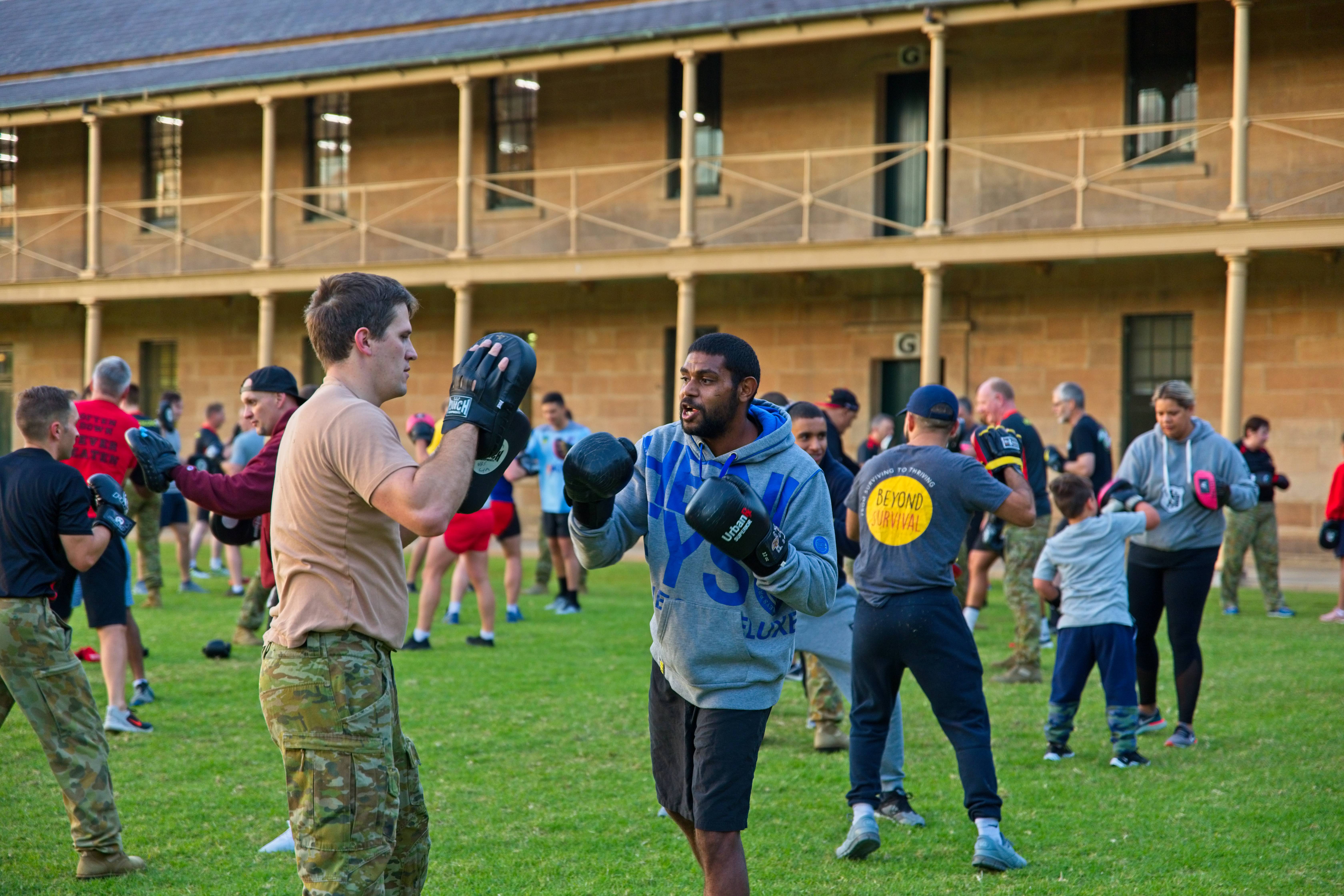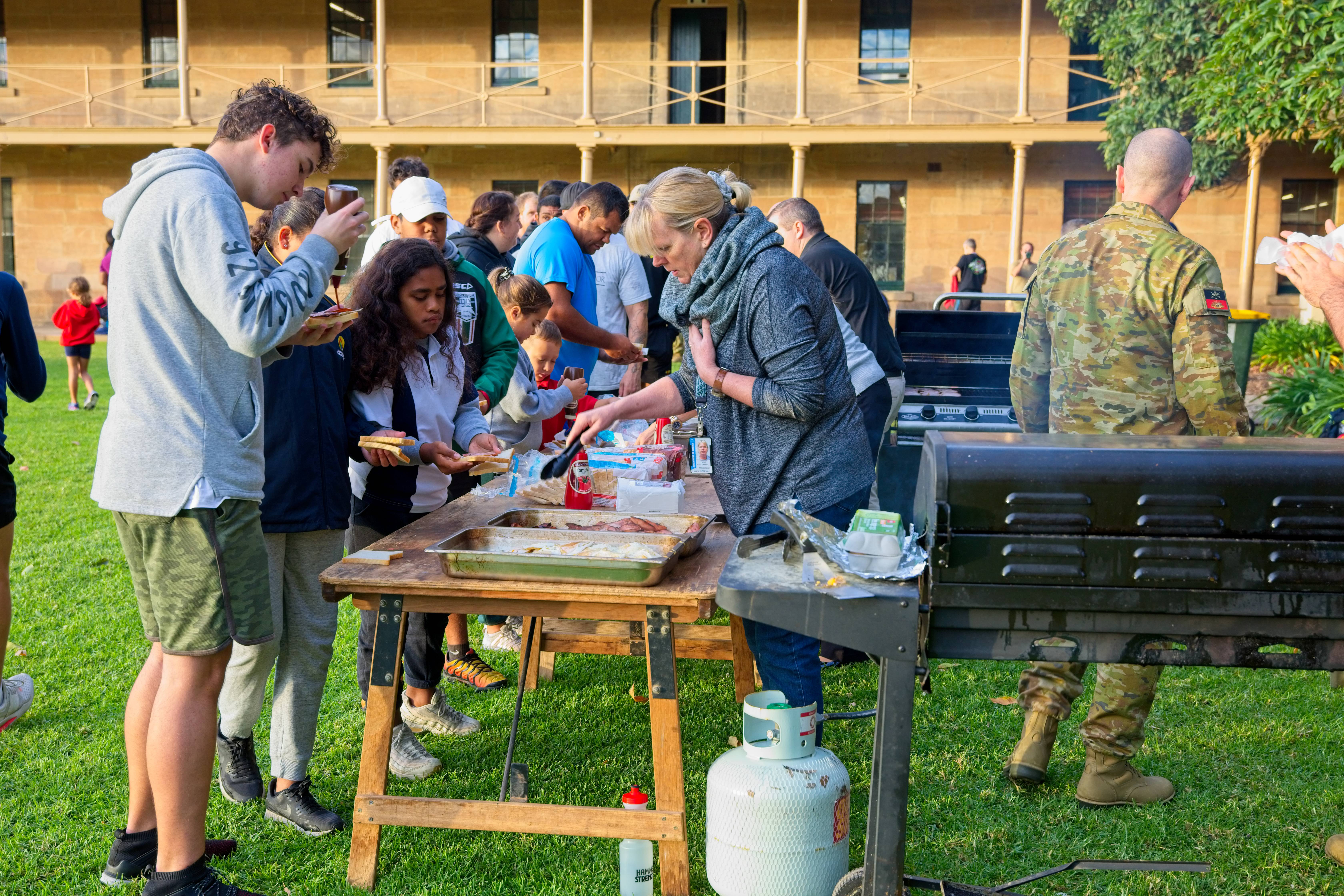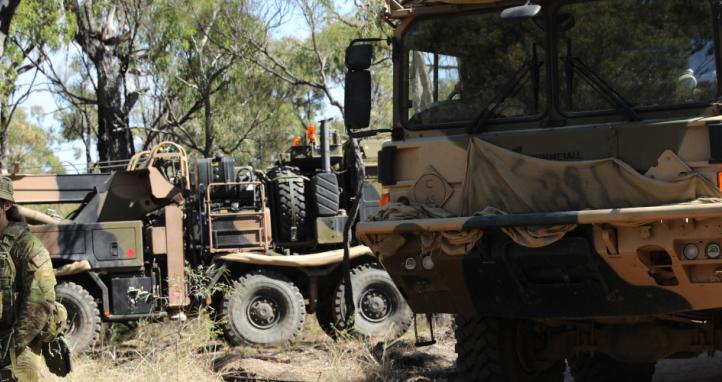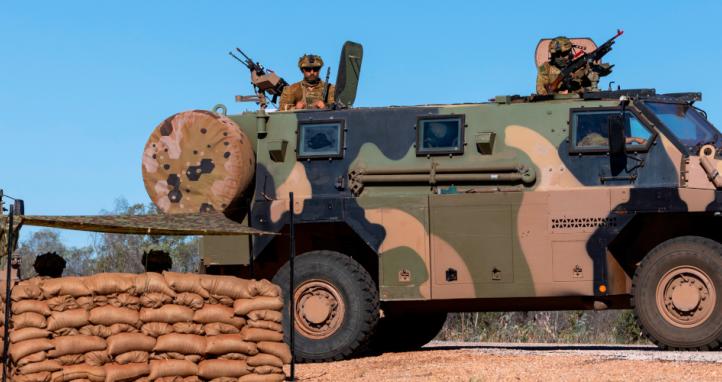An early start a Victoria Barracks
The cool wind was blowing gently across the oval at 0500 hours on 10 May 2019 as the personal trainers from Randwick met with Defence personnel from Victoria Barracks Sydney in the half light of dawn to conduct the final preparations for 100 Indigenous visitors from Redfern’s Tribal Warrior’s Clean Slate Without Prejudice program. An obstacle course was set up for the young children, while tables, BBQs and food were set out to provide Army hospitality and a good breakfast before the children would go off to school. At 0600 hours, Australian Defence Force personnel from Victoria Barracks, Randwick Barracks and Defence Plaza arrived to host our guests and participate in a unique morning of boxing exercises with the children, mentors and other guests.
Fifteen minutes later, the buses from Tribal Warrior opened their doors and the children ran out onto the oval, some seeing the amazing sandstone architecture of the barracks for the first time, others just so excited to be out on the grass oval with their friends and Defence personnel. Also arriving were vehicles from the Corrective Services Department bringing some inmates from Long Bay jail to participate and to be mentored as part of their rehabilitation program.

Sergeant Cameron Scales and senior mentor, Jacob Saunders, started the warm up exercises with a difference – 15 children under 10 years old raced each other over the obstacle course while everyone else was mixed up (Army and Defence personnel with our Indigenous guests) for a fun dynamic warm up including shaking right and left hands and high fives. After 15 minutes everyone combined for boxercise where everyone rotated partners every five minutes. Young children, Elders and inmates all had the opportunity to box with everyone from senior officers and warrant officers to civilian Defence personnel.
At the end of the activity, all participants and observers gathered in a circle where five young Indigenous children spoke to the group. Jacob acknowledge the effort everyone contributed and the children selected the best participant. Colonel Matthew Stevens welcomed our guests and acknowledged them as the traditional owners and acknowledged the Elders past and present. He then spoke on the importance of the Army values, particularly respect, in our daily lives.
Then it was time to eat!
The Defence Community Organisaton, Sydney and some volunteers had been cooking a fabulous breakfast of bacon and eggs on the Victoria Barracks Regimental Trust Fund BBQs, which was served with simplicity – no plates, just a couple of pieces of bread. The Victoria Barracks Museum was opened and our guests were encouraged to view the exhibition of 43 portraits of current and ex-Army Indigenous men and women that link our Indigenous heritage with our Army heritage. Another group, having not had enough exercise, started playing touch football on the oval. And then…. time to go – smiles, good byes, children off to school and work for the adults.

Clean Slate without Prejudice
How did all this start?
It is an amazing story of leadership and making right decisions for right reasons. In 2008, Superintendent Luke Freudenstein was posted to Redfern by the NSW Police – a change of command and new eyes looking at decades old problems. At the time, robberies were happening almost daily – 340 that year alone, according to the NSW Bureau of Crime Statistics and Research. In most cases, Superintendent Freudenstein said, the offenders were Aboriginal, with the same few groups of boys seen “there or thereabouts” when the crime took place. Every morning the officers coming on duty would hear the same names in the reports from the night before. These young men became his priority.
Despite having next-to-no experience of working with an Aboriginal community, he knew enough to start turning up at the meetings of the Babana Aboriginal Men’s Group of local leaders. At this point, the police and Aboriginal community were enemies, says Shane Phillips, an Aboriginal leader who is now the CEO of Tribal Warrior. A year after he started work in Redfern, Superintendent Freudenstein walked into the room carrying a list of 15 names he said were linked to the robberies. He told the Men’s Group, 'I can arrest my way out or we can do something together'.
The Men’s Group knew the boys, knew their families. They chose the 10 most influential from the list, knowing the other kids would follow. But follow what? At the time, Freudenstein, who’d had a couple of exhibition fights in his 20s, was boxing at a youth club. Phillips’ father was a former Australian middleweight champion. He agreed to bring the 10 kids along to box.
The Men’s Group insisted Freudenstein bring with him some of the rougher cops, those who had the worst relationships with the Aboriginal boys out on the streets. That first June morning, Phillips and the other men went around the boys’ houses knocking on doors and dragging them out of bed. 'At 5.45am it was raining, freezing cold', Phillips said. 'We’re in the bus waiting and we saw one of the police officers walk in and I knew his reputation. One of the boys said, ‘I hate him’ and we said, ‘We’ve got to go in. We’re going to go in and train.' By the time the session finished, both sides had dropped their guard.
The beauty of the Clean Slate Without Prejudice program lies in its simplicity: discipline and routine. Monday, Wednesday, Friday, you get up and train. Follow the drills, buckle down; when you’re told to run, you run. Good habits are addictive. Train hard in the early morning and you feel great all day. You start to crave that feeling. Three nights a week you’re more likely to head to bed than out onto the streets, because you’ve got to be at the gym again at six. A year later, not one of the 10 boys on Freudenstein’s list had committed an offence. In the two years after he arrived, robberies in Redfern fell 60 per cent.
Since then, the program has expanded. Working in partnership with the police, the local Tribal Warrior Association led by Phillips provides seven full-time mentors who work with 35 Aboriginal youths. Most have been referred by school, social services, the courts or the police. They sign a contract saying they will turn up at boxing three days a week and, in return, their mentor agrees to play a role in their life by, say, dealing with their school or helping them find work.
Never Going Back
If phase one of the program is about keeping kids out of prison, phase two is called Never Going Back. Figures from the Australian Bureau of Statistics show that more than three of every four indigenous prisoners have been in jail before. Superintendent Freudenstein later approached Corrective Services NSW, asking if it would allow some prisoners to take part in the program. A couple of men from Tribal Warrior accompanied him on the run to and from prison.
For Freudenstein, who had to win over some of his own officers, the argument is simple. None of the prisoners involved gets any time off their sentence. If, through boxing and exposure to the work Tribal Warrior is doing, they can be turned into law-abiding taxpayers on release, then that saves police the work of arresting them again. Occasionally he gets asked if this will cost a lot of money. No, he says. Just enough for some shorts, T-shirts and runners, so those involved don’t have to turn up in their prison greens.
Long Bay’s governor, Patrick Aboud, said he told the five who were selected to take part: 'This is your chance to do something with your life. [If you] come back to jail, don’t ask me for nothing ever again.' On Friday last week, the new governor Shannon Kay showed the same support by arriving for the boxing at Victoria Barracks.
Conclusion
In the last few years, the program has been invited regularly to box at Victoria Barracks in Paddington and at Government House where the participants have the opportunity of overlooking beautiful Sydney Harbour. This initiative is part of Headquarters Forces Command ongoing commitment to support Tribal Warrior’s Clean Slate without Prejudice program. Together with them, the NSW Police and Corrective Services we are changing lives.
The author and Department of Defence would like to acknowledge that historic sections of this article are from a report published 29 Jan 16 by Dan Box, Crime Reporter for Australian newspaper.









